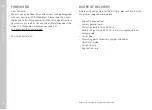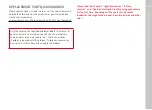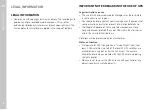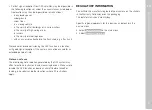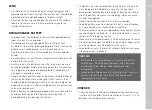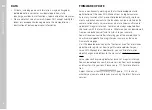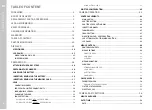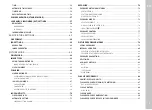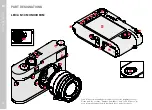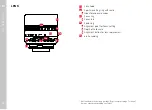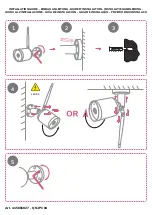
EN
8
SAFETY REMARKS
GENERAL INFORMATION
• Do not use your camera in the immediate vicinity of devices that
generate powerful magnetic, electrostatic or electromagnetic
fields (e.g. induction ovens, microwave ovens, television sets or
computer screens, video game consoles, cell phones, broad-
casting equipment). Their electromagnetic fields can interfere
with recordings.
• Strong magnetic fields, e.g. from speakers or large electric
motors can damage the stored picture data or disrupt recording.
• Switch off the camera, remove the battery briefly, replace it and
switch the camera back on in case of a camera malfunction due
to the effects of electromagnetic fields.
• Do not use the camera in the immediate vicinity of radio
transmitters or high-voltage power lines. Their electromagnetic
fields may interfere with recordings.
• Always store small parts e.g. the accessory shoe cover as
follows:
– out of the reach of children
– in a safe location, where they will not get lost or stolen
• State-of-the-art electronic components are sensitive to static
discharge. Since people can easily pick up charges of several
10,000 volts by walking on synthetic carpets, a discharge can
occur when you touch the camera, and especially it is placed on
a conductive surface. A static discharge on the camera housing
poses no risk for the electronics. Despite built-in safety circuits,
you should avoid direct contact with external camera contacts
like those in the flash shoe.
• Take care not to soil or scratch the sensor for lens detection in
the bayonet. You must similarly prevent direct contact of the
bayonet with grains of sand or similar particles, as these could
cause irreparable damage. This component must only be
cleaned with a dry cloth (in system cameras).
• Use a cotton or linen cloth instead of a microfiber cloth from an
optician's (synthetic) when cleaning the contacts. Make sure to
discharge any electrostatic charge by deliberately touching a
heating or water pipe (conductive, grounded material). Dirt
deposits and oxidation on the contacts can be avoided by
storing your camera in a dry location with the lens cap and the
flash shoe/viewfinder cap (in system cameras) attached.
• Only use accessories specified for this model to prevent faults,
short circuits or electric shock.
• Do not attempt to remove parts of the housing (covers) yourself.
Repairs must be done at authorized service centers only.
• Protect the camera against contact with insect sprays and other
aggressive chemicals. Petroleum spirit, thinner and alcohol must
not be used for cleaning. Some chemicals and liquids can
damage the camera housing or the surface finish.
• Rubber and plastics are known to expel aggressive chemicals
and should therefore not be kept in contact with the camera for
extended periods of time.
• Prevent any sand or dust or water penetration into the camera,
e.g. during snowfall or rain or on the beach. Be extra careful
when changing the lens (in system cameras) and when inserting
or removing the memory card and rechargeable battery. Sand
and dust can damage the camera, the lens, the memory card
and the battery. Moisture can cause malfunctions and
irreparable damage to the camera and memory card.
Legal information
Safety remarks
Safety remarks
Содержание 20 050
Страница 1: ...LEICA M10 MONOCHROM Instruction manual ...
Страница 11: ...EN 11 Safety remarks Safety remarks ...
Страница 23: ...EN Part Designations 23 ...
Страница 41: ...EN Preparation 41 ...
Страница 123: ...EN FAQ 123 ...
Страница 132: ...Index EN 132 W Warranty 15 Wi Fi WLAN 7 WLAN 7 ...
Страница 133: ...EN Index 133 ...


